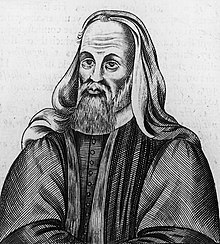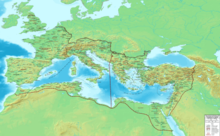Pelagius (theologian)
Pelagius (* approx 350 / 360 , † ca. 418 / 420 ) was an out of the Roman province of Britannia originating lay monk, after the doctrine of Pelagianism was named.
Life

Characterized by an ascetic lifestyle, Pelagius was outraged in Rome , where he appeared as a preacher from around 390 to 410, at the moral negligence of late antique society as he experienced it there. His teaching was marked by the rejection of the doctrine of original sin . In his sermons, for example, he contradicted statements on the theology of divine grace , as they were preached by Augustine of Hippo . He fought his idea of the need for a "greater grace" after the Fall, beyond the grace Adam would have needed in Paradise even without sin. Pelagius believed that Augustine's teaching amounted to introducing Manichaeism into Christianity . He accused Augustine of giving evil the same rank as God and of teaching pagan fatalism as if it were a Christian doctrine. Although he is seen as the originator of Pelagianism, he was not the most important theologian of this current; however, opponents of this view attached their arguments to Pelagius.
When Alaric I sacked Rome in 410, Pelagius and his companion Caelestius fled to Carthage ( Roman province , Africa proconsularis), where Pelagius got into another conflict with Augustine. His follower Caelestius was condemned by a church council, whereupon Pelagius fled to Jerusalem , but soon saw his persecutors on his tracks: Paulus Orosius went to Jerusalem to warn Jerome about him. Although Pelagius was acquitted of heresy at a synod in 415 , Augustine had already launched an effective "campaign" to identify Pelagius and Caelestius as heretics. 416 Pelagius was condemned at the Synods of Carthage and Mileve. At the beginning of 417, the excommunication by the Roman bishop Innocent I took place . Caelestius was also affected by this judgment.
Augustine's version of Pelagius' teaching on sin and atonement was published a. 418 condemned as heresy at the Synod of Carthage .
In contrast to Augustine, Pelagius is said to have represented a positive anthropology : Man is essentially good and the human will is consequently able to obey God's commandments only because of his natural ability. Through asceticism and permanent practice, human nature should be strengthened according to the formula “You can because you want”. In an effort to refute Arianism and Manichaeism as heresies, he emphasized - in contrast to the moral determinism of the latter - the freedom of will, which as a gift from God could never be corrupted by sin.
The approach of Pelagius was brought to philosophical maturity in the work of Julianus of Eclanum (Aeclanum), who defied Augustine in a series of writings. Nevertheless, the Augustinian conception of grace and freedom prevailed in Western Christendom.
Political and philosophical importance
The Pelagian dispute never played the destructive role in the western Roman Empire that the dispute over Monophysitism had in the east. This showed how far church and state violence had already diverged ideally and institutionally in the west of the late 4th century. Nevertheless, the conflict had a not inconsiderable future-oriented significance: in the western empire, unlike in the east, a separation was made between divine and human existence, which on the basis of anti- stoic and Christian ideas led to the idea of human self-assertion against God. With his emphasis on the natural freedom and moral ability of the human being, Pelagius showed here the beginnings of an occidental-western humanism and moralism.
literature
- swell
With the condemnation of Pelagius in 418, his writings were banned. However, much of his work has been preserved. The thoughts of Pelagius are passed down to us in detail in the sometimes extensive quotations from his works, which his opponents, above all Augustine, cite in their anti-Pelagian writings. In addition, some of his writings have been completely preserved. In order to save Pelagius' works from destruction, his students put the names of other authors over some of his writings. These include the two very important works Expositiones XIII epistularum Pauli and Epistula ad Demetriadem .
To this day it is discussed whether further writings of Pelagius were handed down under foreign names. This is currently only being considered for four works from the pseudo-Hieronymus tradition ( Epistula ad Celentiam , De divina lege , De vita Christiana , De virginitate ). However, it is controversial whether these allocations are justified.
- Aurelii Augustini Contra Iulianum , ed. T. Blampin et al., In: J.-P. Migne (Ed.), Patrologia Latina , Vol. 44, Col. 641-874.
- Aurelii Augustini Contra Iulianum opus imperfectum lib. I-III, ed. E. Kalinka and Michaela Zelzer 1974 = Corpus scriptorum ecclesiasticorum Latinorum , vol. 85/1, Vindobonae 1974; lib. IV-VI, ed. T. Blampin et al., In: Patrologia Latina , Vol. 45, pp. 1337-1608.
- A. Augustine, Writings Against the Pelagians , ed. by S. Kopp et al., Würzburg 1955 ff.
- Pelagius, De fide trinitatis (fragment.), In: JP Migne (Ed.), Patrologia Latina , Supplementa Vol. 1, Sp. 1544-60, Paris 1958.
- Pelagius, Epistula ad Demetriadem , in: JP Migne (Ed.), Patrologia Latina , Vol. 30, Col. 15-45.
- Pelagius, Expositiones XIII epistularum Pauli ed. A. Souter (Text and Studies 9,1.2), Oxford 1922–1926.
- Pelagius, Libellus fidei ad Innocentium , in: JP Migne (Ed.), Patrologia Latina , Vol. 45, Col. 1716-1718.
- Secondary literature
- T. Bohlin: The Theology of Pelagius and its Genesis , Wiesbaden, Uppsala 1957.
- G. Bonner: Pelagius / Pelagian conflict . In: Theologische Realenzyklopädie, Vol. 26, (1996), pp. 176-185.
- P. Brown: St. Augustine. Teacher of the Church and innovator of intellectual history . Translated by J. Bernard, Munich 1975.
- Gisbert Greshake : Grace as concrete freedom . An investigation into the doctrine of grace of Pelagius. Grünewald, Mainz 1972 ISBN 3-7867-0365-5 (also habilitation thesis at the University of Tübingen , Department of Catholic Theology, 1972).
- Helmut Hoping : Pelagius (theologian). In: Biographisch-Bibliographisches Kirchenlexikon (BBKL). Volume 7, Bautz, Herzberg 1994, ISBN 3-88309-048-4 , Sp. 168-173.
- AU Sommer: The end of ancient anthropology as a test case for contextualist philosophy historiography: Julian von Eclanum and Augustin von Hippo . In: Journal of Religion and Spiritual History , Volume 57 (2005), Issue 1, pp. 1–28.
- S. Thier: Church near Pelagius , Berlin, New York 1999.
- M. Vessey: Opus imperfectum. Augustine and His Readers, 426-435 AD In: Vigiliae Christianae 52 (1998), pp. 264-285.
- O. Wermelinger: Rome and Pelagius. The theological position of the Roman bishops in the Pelagian dispute in the years 411–432 , Stuttgart 1975.
- Gustav Friedrich Wiggers : Attempt at a pragmatic representation of Augustinism and Pelagianism . Hamburg 1833.
Web links
- Literature by and about Pelagius in the catalog of the German National Library
Individual evidence
- ^ Pelagius , in: Oxford Dictionary of National Biography
- ^ Franz Georg Maier : The transformation of the Mediterranean world. Fischer Weltgeschichte Vol. 9. Frankfurt 1968, p. 163 f.
- ↑ On the corpus of Pelagius' writings and the discussion of the controversial writings, see S. Thier, Kirche bei Pelagius , Berlin / New York 1999, pp. 18–30.
| personal data | |
|---|---|
| SURNAME | Pelagius |
| BRIEF DESCRIPTION | British monk, heretic, opponent of Augustine |
| DATE OF BIRTH | at 350 |
| DATE OF DEATH | 420 |

